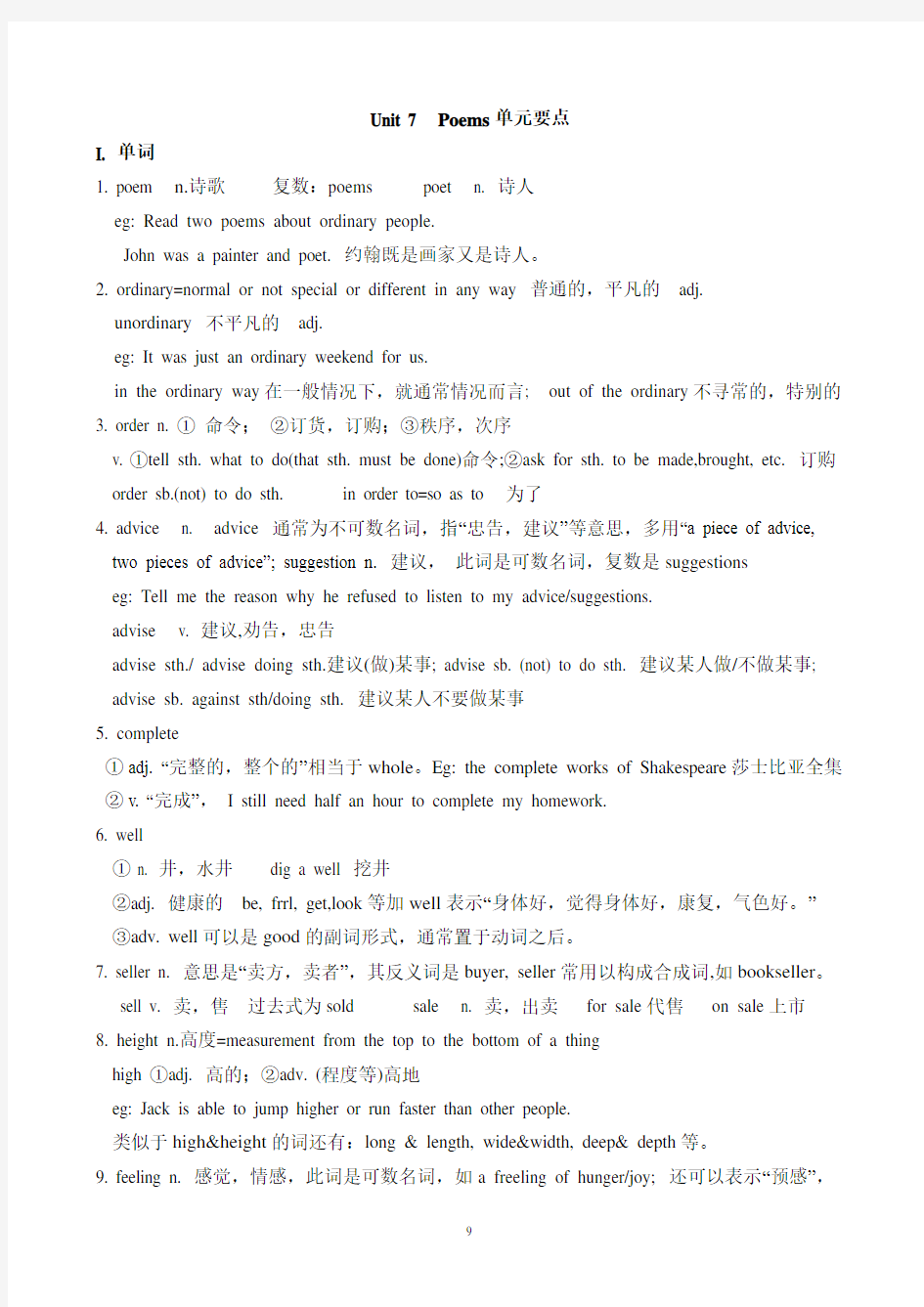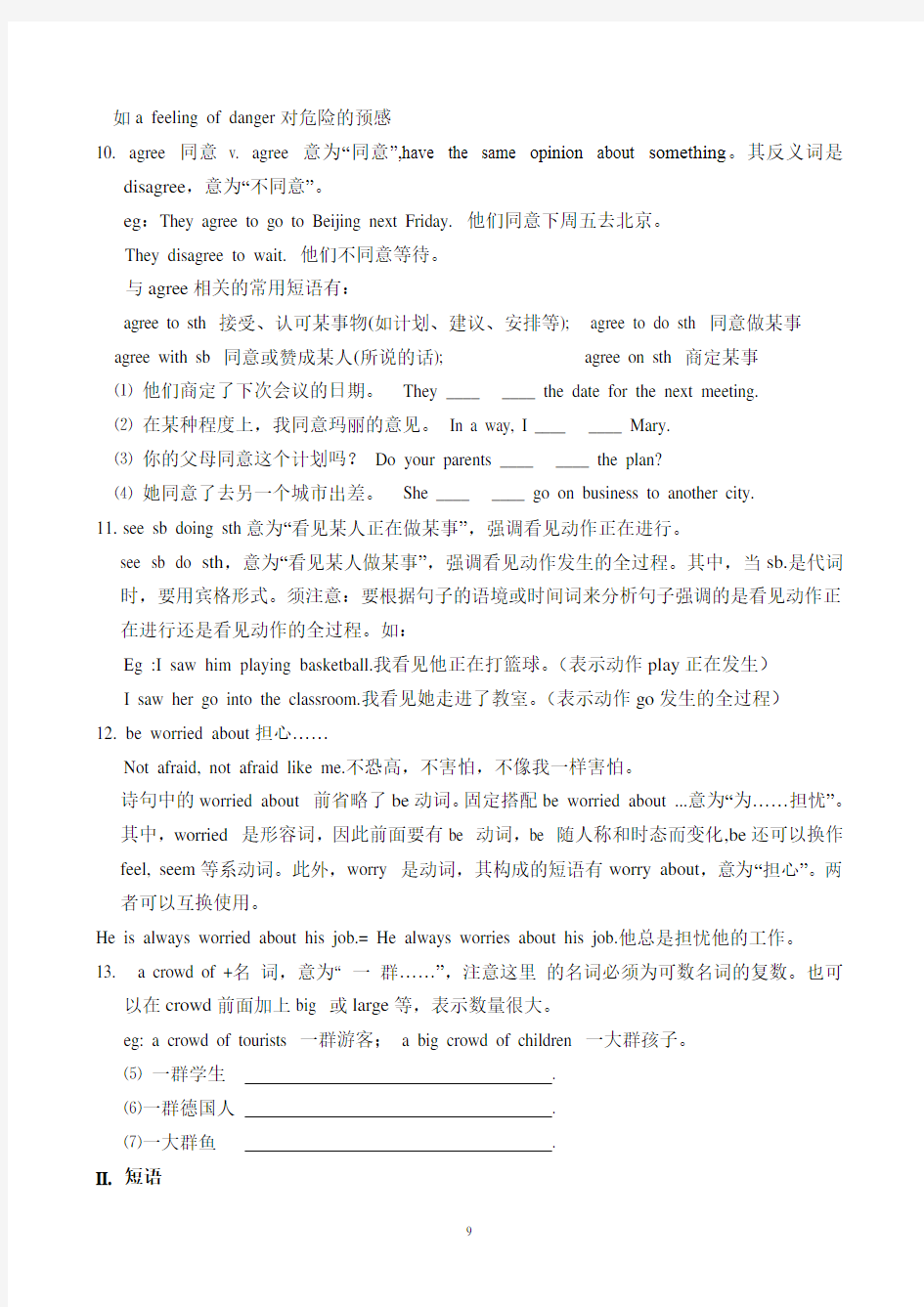Unit 7 单元要点分解


Unit 7 Poems单元要点
I. 单词
1. poem n.诗歌复数:poems poet n. 诗人
eg: Read two poems about ordinary people.
John was a painter and poet. 约翰既是画家又是诗人。
2. ordinary=normal or not special or different in any way 普通的,平凡的adj.
unordinary 不平凡的adj.
eg: It was just an ordinary weekend for us.
in the ordinary way在一般情况下,就通常情况而言; out of the ordinary不寻常的,特别的3. order n. ①命令;②订货,订购;③秩序,次序
v. ①tell sth. what to do(that sth. must be done)命令;②ask for sth. to be made,brought, etc. 订购order sb.(not) to do sth. in order to=so as to 为了
4. advice n. advice 通常为不可数名词,指“忠告,建议”等意思,多用“a piece of advice, two pieces of advice”; suggestion n. 建议,此词是可数名词,复数是suggestions
eg: Tell me the reason why he refused to listen to my advice/suggestions.
advise v. 建议,劝告,忠告
advise sth./ advise doing sth.建议(做)某事; advise sb. (not) to do sth. 建议某人做/不做某事; advise sb. against sth/doing sth. 建议某人不要做某事
5. complete
①adj. “完整的,整个的”相当于whole。Eg: the complete works of Shakespeare莎士比亚全集
②v. “完成”,I still need half an hour to complete my homework.
6. well
① n. 井,水井dig a well 挖井
②adj. 健康的be, frrl, get,look等加well表示“身体好,觉得身体好,康复,气色好。”
③adv. well可以是good的副词形式,通常置于动词之后。
7. seller n. 意思是“卖方,卖者”,其反义词是buyer, seller常用以构成合成词,如bookseller。
sell v. 卖,售过去式为sold sale n. 卖,出卖for sale代售on sale上市
8. height n.高度=measurement from the top to the bottom of a thing
high ①adj. 高的;②adv. (程度等)高地
eg: Jack is able to jump higher or run faster than other people.
类似于high&height的词还有:long & length, wide&width, deep& depth等。
9. feeling n. 感觉,情感,此词是可数名词,如a freeling of hunger/joy; 还可以表示“预感”,
如a feeling of danger对危险的预感
10. agree 同意v. agree 意为“同意”,have the same opinion about something。其反义词是
disagree,意为“不同意”。
eg:They agree to go to Beijing next Friday. 他们同意下周五去北京。
They disagree to wait. 他们不同意等待。
与agree相关的常用短语有:
agree to sth 接受、认可某事物(如计划、建议、安排等); agree to do sth 同意做某事agree with sb 同意或赞成某人(所说的话); agree on sth 商定某事
⑴他们商定了下次会议的日期。They ____ ____ the date for the next meeting.
⑵在某种程度上,我同意玛丽的意见。In a way, I ____ ____ Mary.
⑶你的父母同意这个计划吗?Do your parents ____ ____ the plan?
⑷她同意了去另一个城市出差。She ____ ____ go on business to another city.
11.see sb doing sth意为“看见某人正在做某事”,强调看见动作正在进行。
see sb do sth,意为“看见某人做某事”,强调看见动作发生的全过程。其中,当sb.是代词时,要用宾格形式。须注意:要根据句子的语境或时间词来分析句子强调的是看见动作正在进行还是看见动作的全过程。如:
Eg :I saw him playing basketball.我看见他正在打篮球。(表示动作play正在发生)
I saw her go into the classroom.我看见她走进了教室。(表示动作go发生的全过程)
12. be worried about担心……
Not afraid, not afraid like me.不恐高,不害怕,不像我一样害怕。
诗句中的worried about 前省略了be动词。固定搭配be worried about ...意为“为……担忧”。
其中,worried 是形容词,因此前面要有be 动词,be 随人称和时态而变化,be还可以换作feel, seem等系动词。此外,worry 是动词,其构成的短语有worry about,意为“担心”。两者可以互换使用。
He is always worried about his job.= He always worries about his job.他总是担忧他的工作。
13. a crowd of +名词,意为“ 一群……”,注意这里的名词必须为可数名词的复数。也可
以在crowd前面加上big 或large等,表示数量很大。
eg: a crowd of tourists 一群游客;a big crowd of children 一大群孩子。
⑸一群学生.
⑹一群德国人.
⑺一大群鱼.
II. 短语
(not) at all 一点也(不);完全(不) (be) worried about 为……担忧newspaper stand 报摊rush out 冲出去
a crowd of 一群have a shower 淋浴
building site 建筑工地hurry to 急忙去,匆匆赶往hurry to do sth 匆忙做某事put down 放下
walk through 走过feel unhappy about ... 为……感到不开心
at the same time 同时 a narrow piece of wood 一块窄木头
III:祈使句
祈使句常用于给出指令、命令或建议等,祈使句一般以动词原形开头,无时态和数的变化,句末用句号或感叹号,读时用降调。在祈使句的句首或句末加please,可以使语气更加委婉客气。祈使句有肯定和否定两种形式。
1.肯定式祈使句:
①动词原形+其他部分。Tidy up the room, Sam.
②Be+形容词(+其他部分)。Be calm,please.
③Let's+动词原形+其他部分。Let's go to the park together.
2.否定式祈使句:
①Don't/Do not+动词原形+其他。Don't make any noise. The baby is sleeping.
②Don't/Do not + be+形容词(+其他部分)。Don't be noisy in the classroom.
③Let sb not+动词原形+其他。Let's not make so much noise here.
④No+动词ing。No smoking.
IV:感叹句
What:由What引导的感叹句是用来强调修饰名词的,名词前可有其他的定语成分(即形容词或冠词)。单数可数名词前要加不定冠词a / an,复数可数名词或不可数名词前不用冠词。1.What + a / an +adj.+可数名词单数+主语+谓语+其他成分!
What a strong boy he is! What an honest girl Mary is!
2.What +adj.+可数名词复数/不可数名词+主语+谓语+其他成分!
What brave soldiers they are! What fine weather it is today!
How: 由How引导的感叹句是用来强调修饰形容词或副词的。修饰形容词时,句中的谓语动词用系动词,如am, is等;修饰副词时,则句中的谓语动词用行为动词,如fly, run等。1.How + adj.+ a / an +名词+主语+谓语+其他成分!
How exciting a football match it is! How kind an old man he is!
2.How + adj./adv.+ 主语+谓语+其他成分!
How tall Yao Ming is! How fast the dragonfly flies!
3.如果句子是纯粹的“主语+谓语+宾语(或其他成分)”结构,那么,变感叹句时,可在句首直接加How。How I love you! How time flies!
感叹句记忆口诀
感叹句,并不难,what与how应在前。形容词、副词跟着how,what后面名词连。
名词若是可数单,前带冠词a或an。主语、谓语放后面,省略它们也常见。
巧变感叹句
在把陈述句变感叹句时,可以根据以下这种方法——一断二加三换位。
“一断”即在谓语后面断开,使句子分成两部分。如:
He works hard. → He works / hard.He is a good worker. → He is / a good worker.
“二加”即在第二部分前加上how(强调形容词、副词)或what(强调名词)。如:
He works(how)hard. He is(what)a good worker.
“三换位”即把第一部分和第二部分互换位置,句号换感叹号。如:
How hard he works! What a good worker he is!
巩固练习
I.根据括号里的中文意思填空,使句子完整、通顺。
1.Please _____________ (安静), boys and girls! 2._____________ (关闭) your phone, please. 3._____________ (不要吃) in class, Bill. 4._____________ (让我们玩) together. 5._____________ (禁止拍照) in the museum! 6._____________ (不要迟到) again.
7._____________ (当心)! A car is coming.
8._____________ (让我们不要)use the plastic bags!
II.填入适当的词完成下列感叹句。
1.________ difficult homework we had yesterday!
2.________cute dog it is!
3.________ interesting the story is!
4.________ bad the weather in England is!
5.________ honest boy Tom is !
6.________ tasty smell the cake gave off!
7.________ good time we had on the beach yesterday!
8.________ exciting news you've brought us!
9.________cool your new car is! 10.________ scary these tigers are!
III.根据句意及首字母提示填写单词,使句子完整、通顺。
l. This book is about o________ people like you and me.
2. Daisy likes to keep a diary to express her f________.
3. Taking a s________ instead of having a bath can save more water.
4. Jack saved the boy like a s________.
5. There are a lot of long and n________ roads in the town.
6. What is the h___________ of the mountain?
7. Don’t w___________ about him, because he is old enough to take care of himself.
8. I’m w___________ about him , because he hasn’t come back yet.
9. My teacher gave me some a ________. It is helpful for me to study English.
10. My friend a ________to see a film with me. It is very kind of her to do that.
11. The _________ (sell) likes collecting old books.
12. He read the letter ___________ (大声地) to make sure everyone can hear him.
13. It was time to get on the train. People ___________ (迅速移动) to check tickets.
14. The road is too ___________ (狭窄的) . Cars can hardly get through it.
15. He pushed his way through the ___________ (人群).
IV. 根据中文提示完成下列句子,每空一词。
1. 当我买他的报纸时,他总是对我笑。
When I buy his newspapers, he always ________ at me.
2. 年轻的时候,我常常写诗。
I ________ ________ ________ poems ________ I was young.
3. 看!他跑的好快呀!
Look! ________ ________ he ________!
4. 请不要在这里大声说话。
________ ________ ________ here.
5. 不要给鱼喂太多的食物。
________ ________ too much food to the fish.
6. 她脸上有一种厌倦的表情。她认为这个聚会很无聊。
There is a _______ expression on her face. She thinks the party is ___________.
7. 那座山高900米。
The mountain is 900 metres ___________. = The __________ of the mountain is 900 metres. V. 改错。
( ) 1. Don’t leaving the window open on a windy day.
A B C D
_________ ( ) 2. What excited the girl is! She can’t speak any words.
A B C D _________ ( ) 3. Keeping away from the dog, please. It looks so dangerous.
A B C D _________
答案
13.a crowd of students,
a crowd of Germans,
a big crowd of fish
巩固练习
I:1.be quiet \
2.Turn off
3. Don’t eat
4. Let’s play
5. No photos/No taking photos/Don’t take photos
6.Don’t be
7.Look out!/Watch out!
8.Let’s not
II:1.What 2. what a 3. how , 4. how 5. what an
6. what a
7.what a 8. what 9. how 10 how
III . 1. ordinary 2, feelings
3. shower
4. superman
5. narrow
6. height
7. worry
8. worried
9. advice 10. agreed 11. seller 12. loudly 13 rushed 14 narrow 15 crowd
IV 1. smiles
2. used to write when
3. How fast he runs
4. Don’t talk loudly
5. Do n’t feed
6. bored, boring
7. high, height
V 1. B. leaving→leave 2.
D speak→say 3. A keeping→ keep
